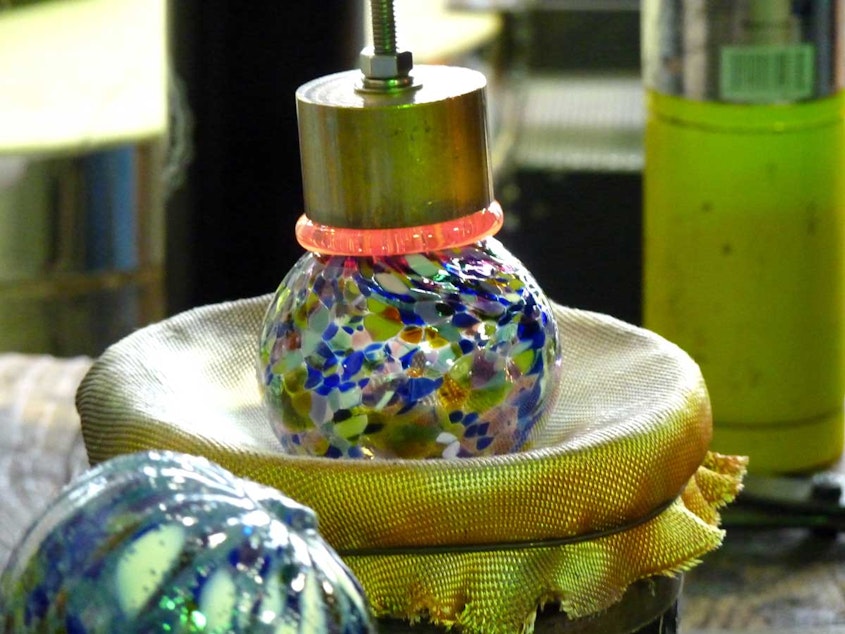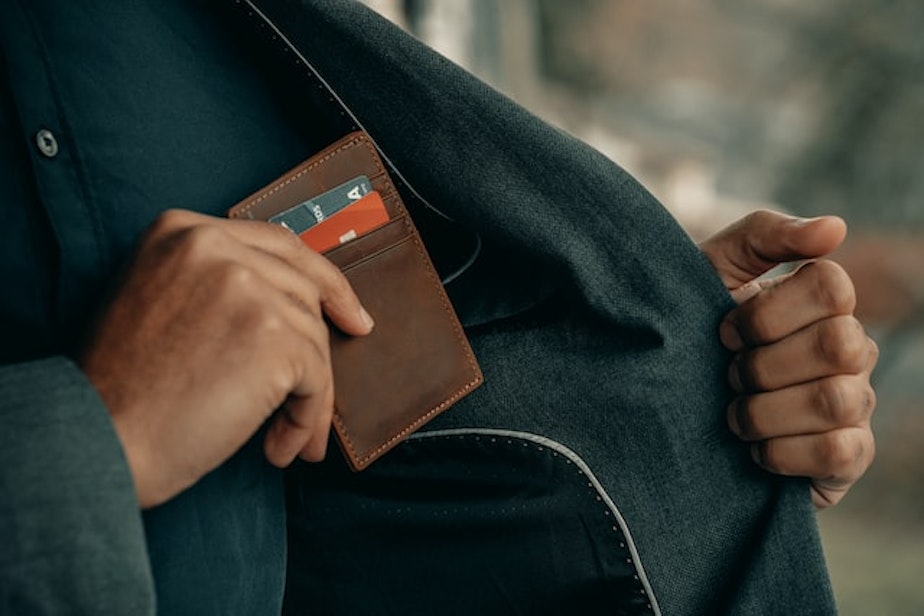Why the SVB fiasco is not like other banking disasters: Today So Far

This post originally appeared in KUOW's Today So Far newsletter for March 15, 2023.
The short version is that banking rates rose in the United States, causing businesses, financial backers, and banks to be more cautious. This prompted anxiety, which prompted rumors, and worse, social media posts. Then Silicon Valley Bank went looking for more money to operate during this time and that prompted more anxiety. Businesses ran to pull their money out of the bank, all at once, and SVB buckled under the strain. An event like this is known as a "bank run," which is not as fun as it sounds. They should really come up with another name.
"In hindsight, people are looking at this and saying, 'This was caused by Twitter,'" Seattle Times reporter Paul Roberts told Seattle Now this morning. "This was essentially a bank run fueled by wild speculation on Twitter, in addition to a couple venture capital funds telling their portfolio companies to get out of Silicon Valley Bank. What bank could withstand that? We are used to thinking of bank runs as slow-motion disasters. It takes time to move money, or it used to. It takes time to hear that there is a bank run. Not anymore. We can move money in seconds, we can get the news out, and the concern and the anxiety out, in nanoseconds. I think that is something that regulators, and investors, and companies, and the industry broadly are going to have to think about. How do we protect ourselves against sector-destroying rumors without curbing communication and free speech?"
What happened with SVB is now known as the worst banking disaster since 2008. Again, that is the short version. The longer version is where all the nuance lives.
As Roberts explained, tech companies and startups are not like other businesses. There are specific, big risks involved. The products these companies produce may eventually work, or not, or they work as well as the infamous opti-grab. It can also take a lot of time to get revenue going and turn a profit. Silicon Valley Bank specialized in working with this sector, and its big risks. After a startup got venture capital backing, SVB provided a loan on top of that, and bam, the company had money to pay the bills.
Sponsored
As Seattle Now reports, this setup made SVB a good fit for another industry — Washington's wine businesses. Such wine operations come with their own big risks. When trouble struck SVB, and tech companies starting sweating, so did Washington's wine companies. So right now, Roberts says that wine companies are experiencing "the same mix of short-term relief and long-term uncertainty" that tech companies are. Which is also the feeling folks generally get after they drink too much wine.
When it became more expensive to borrow money, and therefore do business. That hit an industry like tech uniquely. Financial backers weren't as forthcoming with funds. Companies started taking more money out of the bank to pay the bills, that tightened things at SVB, which turned around and sold some assets to keep things going. This is like when bills are due and you hold a garage sale to keep the lights on. Only SVB didn't have musty records, '90s flared jeans, and hundreds of Funko Pop! figures to cash in on. It had $1.8 billion in bonds, which it sold at a loss. When banking colleagues and tech customers saw this "garage sale" going on, folks got nervous and started pulling their money out of the bank, just in case. Well, that just made the situation worse.
That led to a tense meeting last week for Seattle startups. Roberts said startup CEOs meet up about once a month, which happened to be last Thursday. In the middle of the meeting, four CEOs got calls from their investors and venture capital backers, telling them to pull their money out of SVB right away. Two were able to do that, the other two could not access their money.
"I think a lot of it was just a traffic jam," Roberts told Seattle Now. "People were trying to file wires and the system was overloading around that bank ... It was probably a pretty surreal moment. Bank runs are kind of a thing you see in black and white movies. To have something happen like that right now, when you couldn't get your money out of a bank in an age of Venmo and instantaneous cash, must have been terrifying."
One such concerned local company was Strike Graph. Luckily, CEO Justin Beals said things worked out, but it was tense amid last weekend's uncertainty.
Sponsored
"Our immediate concern was the operational capabilities of Strike Graph, and as a business we need to pay our employees, we need to pay our vendors, we need to pay our bills," Beals told KUOW. "That's part of our operational capacity. By Monday, we were able to execute all those business operations we needed to, allowing us to not really miss a beat."
Depending on who you ask, numbers vary on exactly how many Seattle startups use SVB. The general answer is, "a lot." Roberts estimates it's around 30-50% of Seattle tech startups, others say it could be 50-80%.
The state of California stepped in, and the FDIC stepped in, and even President Biden stepped in. Businesses were told that their money would be secure, even beyond the standard $250,000 insurance coverage the FDIC offers.
"The thing that's interesting about Silicon Valley (Bank) is the nature of the deposits," Joe Phillips, dean of Seattle University's Albers School of Business and Economics, told Soundside. "So it's not like your typical bank — it doesn't have a lot of mom and pop deposits with $5,000 or $10,000 in their checking account. It's got checking accounts with millions and hundreds of thousands of dollars in it."
The thing to understand about all this, Phillips notes, is that it is not anything like the 2008 financial disaster, which spoke more to systematic issues. He brought up Washington Mutual as a local example.
Sponsored
"I'd say there's no comparison — this is not a systemic problem," he said. "Back in the day with WAMU, the problem was with the underlying value of a lot of the assets, the loans that they were holding."
And in the case of SVB, "bailouts" aren't similar either.
"Who is not getting bailed out? Here, it's the management of the bank, because they lost their jobs. The shareholders are not getting bailed out, because they're taking a loss," Phillips said.
The failure of SVB is now being tied into anxieties around the tech industry in general, which has experienced a range of layoffs in recent months. Meta, Facebook's parent company, just announced 10,000 more layoffs on top of the 11,000 employees it let go in 2022. It is also leaving 5,000 open positions unfilled for the time being. KUOW's Monica Nickelsburg reports that, while it is unknown how this will affect Seattle's branch of Facebook operations, the company is scaling back its presence in the city. Facebook opened offices in Seattle in 2010, focusing on engineering. It is now looking to sublease its six-story office building in downtown. Read more here.
Microsoft said it was nixing 10,000 jobs in January. About 2,200 Seattle area employees have been let go as a result. Last week, Microsoft began laying off 689 more employees across its offices in Bellevue, Issaquah, and Redmond.
Sponsored
AS SEEN ON KUOW

Every Lunar New Year, a group of volunteer artists sneak through Tacoma in the dead of night. They hide thousands of colorful glass “floats” — 5- to 10-inch orbs, with an insignia stamped on the top. If you’ve been in Tacoma sometime over the past month and seen people shaking bushes, climbing trees, or turning up rocks, you’ve likely seen a collector of what are locally called “Monkeyshines.” (Jeannine Sigafoos)
DID YOU KNOW?
The movie "Cocaine Bear" provided a lot of jokes and gimmicks at the recent Oscars ceremony. It's a ridiculous concept, which is where the comedy comes from, however, the tale of the cocaine bear is a "true" story. I say "true" in that there actually was a bear who got into a big pile of cocaine, once upon a time. Hollywood's version is not so accurate beyond that point.
Sponsored
This is one of those urban legends that is rooted in an actual event. Andrew Carter Thornton II had a varied career — Army paratrooper, police officer, and lawyer. Through most of it, he had a side gig — drug smuggler. In 1985, he was parachuting over Tennessee with a duffel bag full of cocaine when he ran into a problem. His parachute would not open. That was the end of Thornton's story. About a month later, a hunter in Georgia came across a deceased bear next to a torn up duffel bag. It was later determined that the 200-pound black bear died from cocaine toxicity. The bear didn't get to all the cocaine, and it is believed that someone got away with whatever was left. So the true story is not so much a tale of a frenzied bear on a murder spree.
Animals coming into contact with drugs is, apparently, not uncommon. NPR recently reported about a serval named Amiry. A serval is a type of wild cat native to parts of Africa. It's the type of wild animal that is generally not legal to own, yet he was found in Cincinnati. Amiry ran free from his owner during a traffic stop. The cat was hanging out in the car at the time. Pretty soon, calls were coming into the local animal control about a "leopard" in a tree (it was Amiry, servals can look a bit like leopards). He was brought to a shelter and given an exam by a veterinarian, who confirmed that the cat was indeed a serval. The vet also confirmed that Amiry had cocaine in his system. According to NPR, Cincinnati animal authorities recently began a policy to test exotic animals they come across for drugs, after they confiscated a capuchin monkey named Neo last year. Neo's owner posted videos that showed them giving the monkey some kind of substance. Neo tested positive for amphetamines and underwent treatment. Both animals are now in better homes.
I once heard it said that "Cocaine is God's way of telling you that you have too much money." Stories like these seem to confirm that sentiment.
ALSO ON OUR MINDS

The unexpected American shopping spree seems to have cooled
An unexpected spending spree by U.S. shoppers seems to have calmed. Retail spending declined 0.4% in February compared to January, the Commerce Department said on Wednesday. That's after a surprise start-of-the-year shopping spree that contradicted the Federal Reserve's goal of cooling down the economy to fight high prices.

